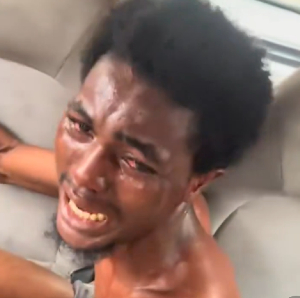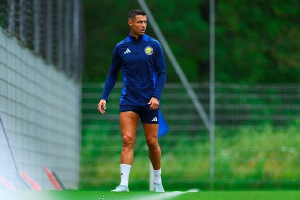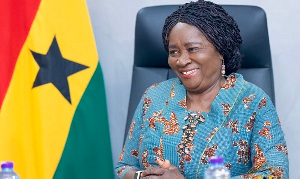: MORE POLITICAL WILL IS NEEDED!
The Voice of the Youth - Time with Richard Obeng Mensah - borncapy@yahoo.com
Don’t forget about those in jail. Suffer with them as though you were there yourself. Share the sorrow of those being maltreated, for you know what they are going through – Hebrew 13:3
Ghana, the gateway to Africa, is endowed with natural resources such as gold and oil. In addition, she continues to enhance her democratic credentials. Finally, she has solemnly declared and affirmed her commitment to: Freedom, Justice, Probity, and Accountability. However, Ghana’s prisons are being congested at a galloping pace because of injustice and inadequate political will. The Land of Freedom and Justice is seemingly denying the rights of her detainees and prisoners. And the political attempt to tame the trend is palpably poor. Why? Detainees and prisoners are generally considered as less important people by, especially, the public. They are simply social outcasts and the stigma attached to them causes both individuals and government alike to virtually ignore their plight and rights. What should be done? It is high time we actually recognised and promoted the rights and liberties of remand prisoners, prisoners and prisoners of conscience. Every individual within the jurisdiction of Ghana must receive his fair share of the country’s so-called brimming milk of freedom and justice. When? Now! Right now is the right time. This is the time to right this human wrong in Ghana rightly.
Injustice in the Prisons is a Threat to the Entire Ghanaian Society The Supreme Law of the Land of Freedom and Justice, 1992 Constitution, at its article 14 protectively seeks to guarantee the personal liberties of all persons. Articles 14(2) to (7) are to the effect that the rights of remand prisoners and prisoners are steadfastly guaranteed and entrenched. To facilitate the practical implementation and enforcement of these provisions, article 12(1) instructively calls on the Executive, Legislative and Judiciary and all other organs of government and its agencies and, where applicable to them, by all natural and legal persons in Ghana to not only respect but also execute these lucid provisions.
However, after about 15 years of the coming into force of the 1992 Constitution, Ghana’s prisons, which are supposed to serve as rehabilitation homes, are rather witnessing the highest rate of congestion due to the condoning height of injustice by us. Why are we behaving this way? Perharps we think we are not affected. On the contrary, we are terribly affected. I agree with Dr. Martin Luther King Jnr.’s assertion that a threat to the justice of individuals in society is a terrible threat to the justice of entire society. Condoning the injustice within our prison walls is a strong indication that injustice is gaining deep roots in every facet of the country. The latest finding on how mental patients are being maltreated at the Accra Psychiatric Hospital is a good example to support the fact that injustice is gaining ground in Ghana. A myriad of cases and instances can readily be cited to further illuminate this unfortunate development. Well, I will save my breath for another day since this article focuses on the injustices and the congestion within Ghanaian prison facilities.
Congestion in the Prisons Congestion in Ghana’s prisons is one of the exigent issues that continue to dominate the headlines of the Ghanaian media. It is therefore not out of place that the massive overcrowding and woefully deteriorating conditions of Ghana’s prison system had led observers to liken the facilities to “slave dungeons” and “human warehouse”. In the words of Justice Georgina Wood, the Chief Justice of Ghana, the situation constitutes “grave injustice”.
The 2006 Ghana’s Prison Service Annual Report revealed that Ghanaian prisons held 12,847 prisoners in facilities designed to hold approximately one-third of that number. According to the report, of those prisoners, approximately 29.5% (3,790) are remand prisoners, waiting in prison for their cases to be reviewed by a court of law. These remand prisoners however continue to remain in custody for up to several years because they are unable to secure bail or have no access to counsel. Therefore, detainees generally serve more time in detention waiting for trial than sometimes the maximum sentence for the offence they are accused of. In 2004 for instance, the Director General of Prisons, while inspecting prison facilities in this country, met numerous remand prisoners who had been detained for up to 10 years without trial. Indeed, this development is everything contrary to freedom and justice.
The trend continues to deteriorate! The report covering the inspection of Nsawam Prisons in August, 2009 by Mr. Emile Short, the Commissioner for the Commission for Human Rights and Administrative Justice (CHRAJ), for instance, indicates that there are 1,554 remand prisoners at Nsawam Medium Security Prisons alone. This figure constitutes 57% of about 3,000 inmates in the prison built for 717 inmates. Besides, the 1,554 remand prisoners have been in the prison for a period between 3 to 20 years. The story about one Dan H. Amedzro who has been on remand at Nsawam Prison for about 17 years for example paints a damning picture.
More Political Will is Needed! In response to the growing problem of congestion and injustice at the Ghanaian prisons, the Ministry of Justice and Attorney General of Ghana in September, 2007 launched the “Justice for All Programme”. The project is meant to provide timely access to justice for remand prisoners who have served an unwarranted time in detention without a trial. However, due to a lack of resources and committed legal staff, the Justice for All Proggramme is mainly being piloted in Accra alone, leaving the fate of the other remand prisoners in the other regions dangling.
The issue of inadequate resources to facilitate the Justice for All Programme clearly reveals the lack of government’s total commitment to secure the rights and freedoms of all persons in this country. Does the lackluster attitude of the government suggest that the pursuance of freedom and justice is no longer one of Ghana’s development priorities? I sometimes find it very interesting, if not ludicrous, when prisoners of conscience after their acquittal or discharge suddenly turn to be advocates of the rights of detainees and prisoners. No wonder their sermons usually turned out to be a nine days’ wonder. Besides, there have been several instances in this country where members of some pressure groups and political parties went on demonstrations, organiseed symposia and other public fora in the name of championing the rights of especially politicians whose rights and freedoms, in their views, were being trampled upon by reason of detention or imprisonment. Yet these groups are yet to see whether there is anything amiss with the injustices within our prison facilities. This attitude is not only hypocritical, but also deepens the fact that detainees and prisoners are considered as less important persons in the Ghanaian society.
The Way Forward Firstly, the government should actually show more commitment towards the need to sanitise the poor conditions and injustices within our prison facilities. Secondly, I will continue to advocate that detainees and prisoners should be allowed to exercise their franchise in all public elections and referenda. Truly, if detainees and prisoners were also voters, politicians would seek out their views when canvassing for votes. By this, politicians will go all way out to promote their rights. Thirdly, civil societies in and outside Ghana should not relent in their efforts to secure the rights of all prisoners in, especially detainees. Lastly, we, Ghanaians, should desist from being apathetic towards the plights of detainees and prisoners. Instead, let’s have empathy for them and advocate on their behalf. Kwame Atta and Fati may be the victims today but who knows tomorrow?
The writer is the author of Persecutions are Promotions and If You Think of Your Opposition You Lose Your Position. He is also the 2009 National Best Student Author/Writer.
Opinions of Saturday, 9 January 2010
Columnist: Mensah, Richard Obeng














